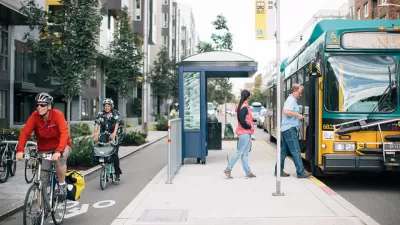Heatwaves are the leading cause of deaths related to weather. A new study seeks to understand the impact of heatwaves and extreme heat exposure on humans and the cities in which they live.

"The motley drivers of heat and cold exposure in 21st century US cities," a paper published by the Proceedings of the National Academy of Sciences (PNAS), reports on the findings of a new study about human exposure to extreme heat.
To humanize the research, the study reports impact in terms of person-hours: the number of hours of intense exposure experienced by humans.
"Overall, the researchers found that the average annual heat exposure at the start of this century in the United States was about 5.2 billion person-hours. They calculated that assuming a worst-case scenario of peak global warming, population growth and urban development, the annual heat exposure would rise to 150 billion person-hours by the end of the century, a nearly 30-fold increase," writes Sarah Wray.
The Arizona State University researchers responsible for the study make use of a climate change modeling approach to better understand the influence of climate change on cities. In the United States, sunbelt cities were found to be the worst affected cities.
Wray's article summarizes the key takeaways from the research and makes suggestions about how cities can increase their resiliency in the face of climate change. Wray also notes that the researchers are working on a followup paper to communicate "city-specific estimates of the avoided heat exposure derived from urban adaptation measures and greenhouse mitigation."
FULL STORY: Study highlights US cities at risk of rising heat exposure

Alabama: Trump Terminates Settlements for Black Communities Harmed By Raw Sewage
Trump deemed the landmark civil rights agreement “illegal DEI and environmental justice policy.”

Study: Maui’s Plan to Convert Vacation Rentals to Long-Term Housing Could Cause Nearly $1 Billion Economic Loss
The plan would reduce visitor accommodation by 25% resulting in 1,900 jobs lost.

Planetizen Federal Action Tracker
A weekly monitor of how Trump’s orders and actions are impacting planners and planning in America.

Waymo Gets Permission to Map SF’s Market Street
If allowed to operate on the traffic-restricted street, Waymo’s autonomous taxis would have a leg up over ride-hailing competitors — and counter the city’s efforts to grow bike and pedestrian on the thoroughfare.

Parklet Symposium Highlights the Success of Shared Spaces
Parklets got a boost during the Covid-19 pandemic, when the concept was translated to outdoor dining programs that offered restaurants a lifeline during the shutdown.

Federal Homelessness Agency Places Entire Staff on Leave
The U.S. Interagency Council on Homelessness is the only federal agency dedicated to preventing and ending homelessness.
Urban Design for Planners 1: Software Tools
This six-course series explores essential urban design concepts using open source software and equips planners with the tools they need to participate fully in the urban design process.
Planning for Universal Design
Learn the tools for implementing Universal Design in planning regulations.
Caltrans
Smith Gee Studio
Institute for Housing and Urban Development Studies (IHS)
City of Grandview
Harvard GSD Executive Education
Toledo-Lucas County Plan Commissions
Salt Lake City
NYU Wagner Graduate School of Public Service





























